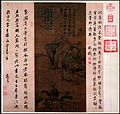- Zhao Mengfu
-
 Zhao Mengfu, Autumn colors on the Qiao and Hua mountains (left half)
Zhao Mengfu, Autumn colors on the Qiao and Hua mountains (left half)
Zhao Mengfu (simplified Chinese: 赵孟頫; traditional Chinese: 趙孟頫; pinyin: Zhào Mèngfǔ; Wade–Giles: Chao Meng-fu, 1254–1322) courtesy name Ziang (子昂), pseudonyms Songxue (松雪, "Pine Snow"), Oubo (鸥波, "Gull Waves"), and Shuijing-gong Dao-ren (水精宫道人, "Master of the Crystal Palace"), was a prince and descendant of the Song Dynasty, and a Chinese scholar, painter and calligrapher during the Yuan Dynasty.
He was recommended by the Censor-in-chief Cheng Jufu to pay an audience with Kublai Khan in 1286 at the Yuan capital of Dadu, but was not awarded an important position in office. His work was however, greatly appreciated later by the Confucian-inspired Yuan Emperor Renzong.
He was married to Guan Daosheng, who was also an accomplished poet, painter and calligrapher. His rejection of the refined, gentle brushwork of his era in favour of the cruder style of the eighth century is considered to have brought about a revolution that created the modern Chinese landscape painting. He was known for his paintings of horses. His landscapes are also considered to be done in a style that focuses more on a literal laying of ground. Rather than organizing them in a foreground, middle ground, and background pattern he layers middle grounds at various heights to create a sense of depth. This pattern of organization makes his paintings appear very simple and approachable. It was this characteristic that so many people valued about his style.
See also
- Hanlin Academy
- Yuan poetry
References
- Mu, Yiqin, "Zhao Mengfu". Encyclopedia of China (Arts Edition), 1st ed.
External links
- Zhao Mengfu Calligraphy "Rhapsody on Goddess of Luo"
- Calligraphy Gallery of Zhao Mengfu at China Online Museum
- Painting Gallery of Zhao Mengfu at China Online Museum

This article about a Chinese painter is a stub. You can help Wikipedia by expanding it.





